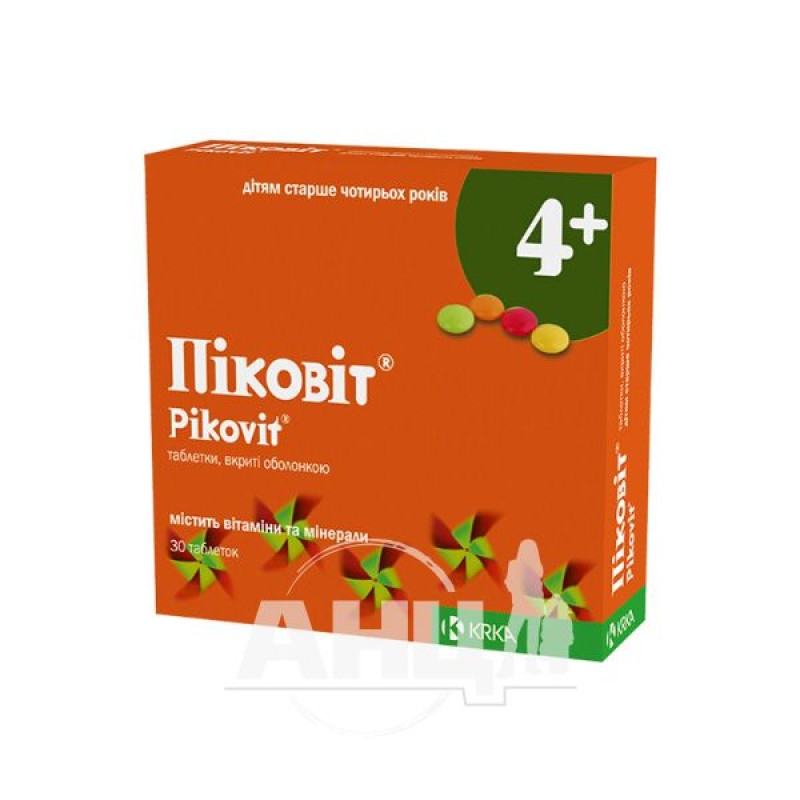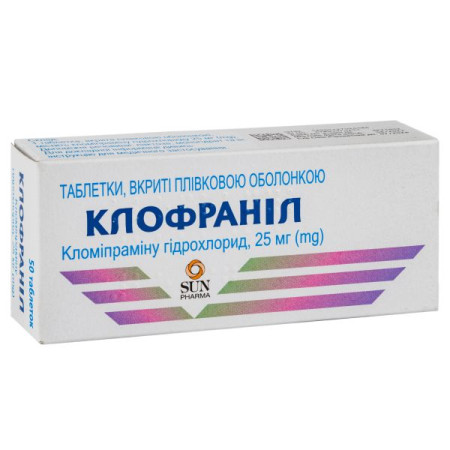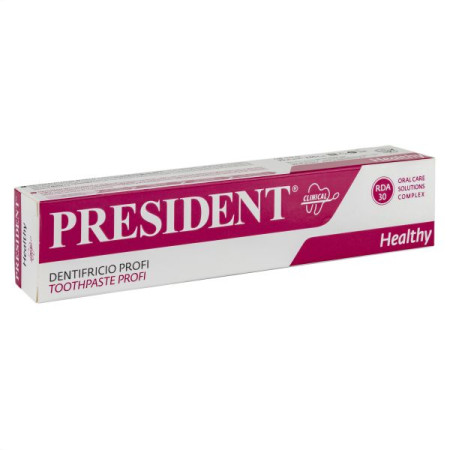Pikovit film-coated tablets No. 30

Pharmacological properties
Pharmacodynamics. Peaks in tablet form contains vitamins in combination with calcium and phosphorus. Vitamins are substances that are involved in the regulation of many biochemical processes in the human body. The effects of vitamins and minerals in the body are mainly physiological, not pharmacodynamic.
B vitamins (B1, B2, B6, B12, pantothenic acid and nicotinamide) are involved in the metabolism of carbohydrates, proteins and fats, and also play an important role in the functioning of the nervous system. Vitamin A is necessary for the development of epithelial cells and for the synthesis of visual pigment.
Vitamin D3 regulates calcium absorption and promotes proper mineralization of bones and teeth. Vitamin C controls iron absorption and participates in redox processes in the body.
Minerals are vital to the body. They form the components of connective tissue and act as activators and components of enzymes.
Calcium and phosphorus play an important role in the mineralization of bones and teeth. Calcium ions activate many enzymes that are involved in the regulation of heart muscle tone, in the transmission of nerve impulses, and in regulating the permeability of cell membranes.
Pharmacokinetics
There are no data on the pharmacokinetics of Pikovit. Due to their complex composition and the fact that vitamins and minerals are normally present in the diet, it is impossible to study such small doses of vitamins as are contained in Pikovit.
Water-soluble vitamins (B vitamins and vitamin C) are well absorbed in amounts consistent with daily needs. Excess amounts are excreted in the urine, and in some cases, in the feces. These vitamins are stored in the body in limited quantities; therefore, they must be administered regularly to maintain appropriate concentrations in the tissues.
In the presence of fat, the fat-soluble vitamins A and D3 are well absorbed in the small intestine when taken orally. When taken in large amounts, these vitamins are stored in the liver and are therefore more toxic than water-soluble vitamins.
Calcium ions are absorbed in the small intestine by active transport and passive diffusion. 45% of calcium is bound to plasma proteins. Excess calcium is mainly excreted in the urine and feces. Phosphate is absorbed in the digestive tract by active transport and passive diffusion and is distributed throughout the blood plasma, extracellular fluid, cell membrane, collagen, and bone. Most of the phosphate is absorbed in the small intestine and excreted mainly in the urine.
Indication
The drug is intended for children:
with reduced appetite; with physical and mental stress in schoolchildren; with developmental delay; as an adjunct to antibiotic therapy; with seasonal deficiency of fruits and vegetables in the diet.Application
For the prevention of hypovitaminosis:
Children aged 4 to 6 years - 1 tablet 1-2 times a day; Children aged 7 to 14 years - 1 tablet 2-3 times a day.For the treatment of hypovitaminosis:
Children aged 4 to 6 years - 1 tablet 4-5 times a day; Children aged 7 to 14 years - 1 tablet 5-7 times a day.The film-coated tablets should be dissolved in the mouth.
With reduced appetite, Pikovit is recommended to be used for 2 months, with other indications - as needed, depending on the duration and frequency of symptoms after consulting a doctor.
Contraindication
Hypersensitivity to the active substances or to any of the excipients; hypervitaminosis with vitamins A and D3; nephrolithiasis; gout; hyperuricemia; erythremia; erythrocytosis; thrombophlebitis; thromboembolism; fructose intolerance, glucose-galactose malabsorption syndrome, sucrase-isomaltase deficiency; disorders of iron and copper metabolism; hypercalcemia; hypercalciuria; thyrotoxicosis; chronic glomerulonephritis, chronic heart failure; history of sarcoidosis; gastric and duodenal ulcers (due to the possibility of increased acidity of gastric juice); pulmonary tuberculosis; renal failure, simultaneous administration of retinoids, untreated cobalamin deficiency, pernicious anemia, malignant neoplasms.
Side effects
On the part of the immune system: hypersensitivity reactions to the components of the drug, including anaphylactic shock, bronchospasm, Quincke's edema.
Metabolism and nutrition disorders: hypercalcemia, calcinosis.
From the nervous system: headache, dizziness, drowsiness, increased excitability.
On the part of the organ of vision: visual impairment.
Gastrointestinal tract: dyspepsia, nausea, vomiting, belching, stomach pain, constipation, diarrhea, increased secretion of gastric juice, heartburn.
Skin and subcutaneous tissue disorders: rash, urticaria, itching, redness, eczema.
Kidney and bladder: urine discoloration, hypercalciuria, damage to the glomerular apparatus of the kidneys.
Others: hyperthermia, increased sweating.
With prolonged use in high doses, the following side effects may occur.
Metabolism and nutrition disorders: hyperuricemia; impaired glucose tolerance, hyperglycemia, impaired glycogen synthesis, anorexia.
Nervous system: paresthesia.
On the part of the heart: arrhythmia, arterial hypertension, myocardial dystrophy, arterial hypotension.
The use of ascorbic acid at a dose of 1 g/day (which is more than 100 Pikovit tablets) in patients with glucose-6-phosphate dehydrogenase deficiency can cause hemolysis of erythrocytes (hemolytic anemia).
Gastrointestinal tract: irritation of the mucous membrane of the digestive tract, flatulence, bitter taste in the mouth.
Skin and subcutaneous tissue disorders: dryness and cracking of the skin on the palms and soles, hair loss, seborrheic rash.
Kidney and bladder: renal failure, crystalluria, formation of urate, cystine and/or oxalate stones.
Investigations: transient increase in AST, LDH, LF activity, increased calcium levels in blood and urine, glycosuria.
Special instructions
If any hypersensitivity reactions occur during treatment, the drug should be discontinued. Before taking other vitamin, mineral and/or mineral-vitamin preparations, it is imperative to consult a doctor. The drug is not recommended to be prescribed simultaneously with other multivitamins, as overdose is possible. Do not exceed the recommended dose.
Diabetics can use Pikovit, but they should take into account that each tablet contains 0.6 g of sugar, and the daily dose contains from 2.4 to 4.2 g of sugar.
Use with caution in patients with a history of kidney disease, liver disease, acute nephritis, cardiac decompensation, cholelithiasis, chronic pancreatitis, allergic diseases, idiosyncrasies, neoplasms, predisposition to thrombosis and bleeding (hemophilia, thrombocytopenia, thrombocytopathies).
The urine may turn yellow, which is a completely harmless factor and is explained by the presence of riboflavin in the preparation.
Absorption of ascorbic acid may be impaired in intestinal dyskinesia, enteritis and achilli. Since ascorbic acid increases iron absorption, its use in high doses can be dangerous for patients with hemochromatosis, thalassemia, polycythemia, leukemia and sideroblastic anemia. Ascorbic acid as a reducing agent can affect the results of laboratory tests, for example, when determining the content of glucose, bilirubin, transaminase activity, LDH.
The drug is prescribed with caution to patients with anemia of unknown etiology, since folic acid can interfere with the diagnosis of pernicious anemia by more pronounced hematological manifestations of the disease, allowing neurological complications to progress. When using folic acid for anemia, it is necessary to systematically perform blood tests. It is not recommended to take the drug for a long time (especially in high doses) due to a possible decrease in the concentration of vitamin B12.
Special information about some of the excipients
Pikovit contains lactose, sucrose, glucose, sorbitol (E420), therefore patients with rare hereditary forms of fructose intolerance, glucose-galactose malabsorption or sucrase-isomaltase insufficiency should not take this medicine. Pikovit contains azo dyes E110 and E124, which may cause allergic reactions.
Patients with known intolerance to some sugars should consult their doctor before taking this medicine.
Use during pregnancy and breastfeeding. The drug is intended for use in children.
During pregnancy and breastfeeding, vitamins and minerals can be used after mandatory consultation with a doctor. Pregnancy should not be planned earlier than 6-12 months after high-dose retinol therapy (more than 10,000 IU), due to the risk of embryonic abnormalities due to the high content of vitamin A in the body.
Children. The drug should be used in children aged 4 years and older.
The ability to influence the reaction rate when driving or working with other mechanisms. The drug is intended for use in children.
Interactions
Due to the possibility of developing hypervitaminosis A, the simultaneous use of Pikovit tablets with other drugs containing vitamin A or with oral retinoids is not recommended. Vitamin A is not recommended to be prescribed simultaneously with oral retinoids, since their combination may be toxic. Retinol may reduce the anti-inflammatory effect of glucocorticoids. It should not be taken simultaneously with nitrites and cholestyramine, since they impair the absorption of retinol.
Pyridoxine reduces the effectiveness of levodopa if the patient takes only levodopa. Vitamin B6 prevents or reduces the toxic effects observed with isoniazid and other anti-tuberculosis drugs. Thiamine can weaken the curare-like effect. PAS, cimetidine, potassium preparations, alcohol reduce the absorption of vitamin B12. Riboflavin is incompatible with streptomycin and reduces the effectiveness of antibacterial drugs (oxytetracycline, doxycycline, erythrocycline, tetracycline and lincomycin). It should be taken at least 3 hours before or 3 hours after taking the antibiotic. Tricyclic antidepressants, imipramine and amitriptyline inhibit riboflavin metabolism, especially in heart tissues. With simultaneous use with quinine, hemorrhages may increase.
The risk of hypercalcemia increases with the simultaneous use of vitamin D 3 and thiazide diuretics. Ion exchange resins, such as cholestyramine and laxatives (paraffin oil), may reduce the absorption of vitamin D 3. Due to metabolic activation, the activity of vitamin D 3 may decrease with simultaneous use with phenytoin or barbiturates. In this regard, it is recommended to take the drug 2 hours before or 2 hours after taking other drugs. Since the concomitant oral administration of calcium and vitamin D 3 preparations enhances the effect of cardiac glycosides, medical supervision and ECG monitoring are necessary during their simultaneous use.
In patients with folate deficiency, the use of folic acid can reduce the level of phenobarbital in the blood plasma and cause an epileptic seizure. Ethanol, cycloserine, glutethimide and methotrexate can affect folate metabolism. The absorption of folic acid is reduced when used simultaneously with analgesics, anticonvulsants, antacids, sulfonamides, antibiotics, cytostatics. Cases of reduction or change in absorption may occur with the simultaneous use of cholestyramine and folic acid. Therefore, the drug should be taken 1 hour before or 4-6 hours after taking cholestyramine. It should not be used simultaneously with mineral acids, alkaline substances, reducing agents, since folic acid is inactivated.
Overdose
When taken in recommended doses, no intoxication is expected. In case of overdose, the likelihood of the above-mentioned adverse reactions increases, and abdominal bloating (flatulence) may occur.
Prolonged use in high doses can cause hypervitaminosis A and D 3, although an overdose of Pikovit tablets is unlikely. An overdose of vitamin D 3 causes weakness, anorexia, nausea, vomiting, diarrhea, weight loss, fever, convulsions, disorders of the cardiovascular system and kidneys. Hypercalcemia may develop due to hypersensitivity to vitamin D 3. Symptoms of hypercalcemia are anorexia, polyuria, nausea, vomiting, general weakness, headache, apathy, thirst. An overdose of vitamin A can lead to headache, dizziness, sleep disturbances, nausea, vomiting, drowsiness, photophobia and convulsions. If the above symptoms appear, you should stop taking the drug and immediately consult a doctor.
With prolonged use of ascorbic acid in high doses, inhibition of the function of the insular apparatus of the pancreas is possible, therefore it is necessary to monitor its functional capacity. Overdose can lead to changes in the renal excretion of ascorbic and uric acids during urine acetylation with the risk of oxalate stone formation. The use of ascorbic acid in high doses can lead to heartburn. If the recommended doses are significantly exceeded (if the dose of vitamin C exceeds 1 g/day, which corresponds to 100 Pikovit tablets), renal failure, sleep disturbances, feeling of heat, increased fatigue, zinc and copper metabolism disorders, increased excitability, erythrocytopenia, neutrophilic leukocytosis are possible.
If signs of overdose appear, the drug should be discontinued. If possible, treatment should be initiated. Vomiting should be induced and the body should be hydrated. If hypercalcemia is detected, a diet with a limited amount of calcium and vitamin D 3 should be followed. Further treatment is symptomatic. Folic acid in very high doses can increase the excitability of the central nervous system and cause convulsions.
Storage conditions
At a temperature not exceeding 25 °C in the original packaging to protect from light and moisture.
There are no reviews for this product.
There are no reviews for this product, be the first to leave your review.
No questions about this product, be the first and ask your question.












